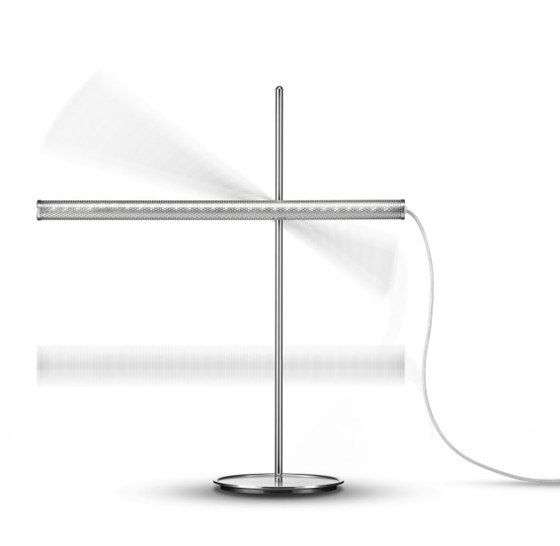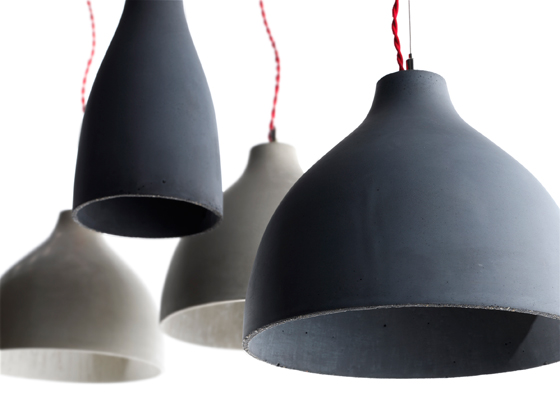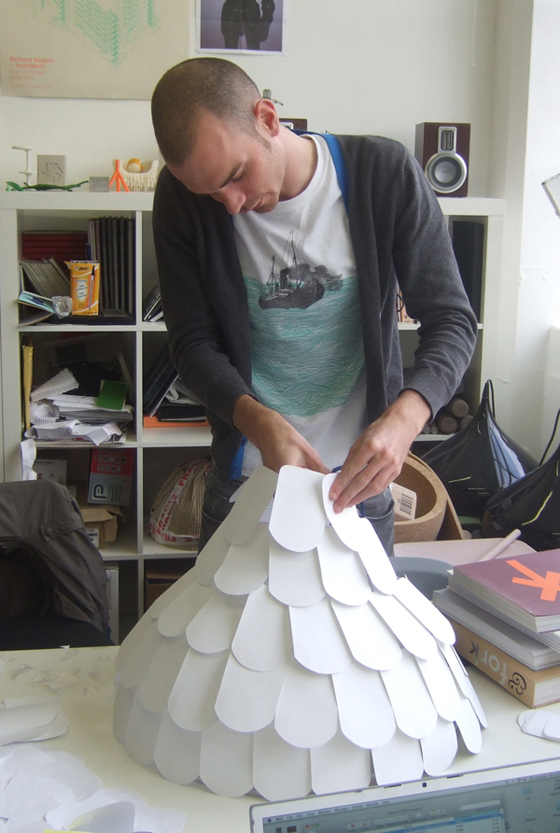Switched On: Benjamin Hubert
Text von Simon Keane-Cowell
Zürich, Schweiz
07.04.11
'Awards come and go,' says Benjamin Hubert. 'They're not a mark of good design, that's for sure.' You'd be forgiven for thinking that there's more than a touch of false modesty or disingenuity at work here, given the celebratory press coverage the young British designer received a couple of years ago, not to mention the numerous plaudits. But not so. In a recent interview with Architonic, Hubert reveals himself to be as pragmatic and self-aware as he is creative.
He may have been fêted by the design press a couple of years ago as the one to watch, and have picked up a raft of awards, but young British designer Benjamin Hubert is no James Dean. Refreshingly sanguine about such oh-so-early professional recognition, and possessing a business nous that counterbalances his creativity, he's determined not to live fast and die young. For, Hubert, it's about the long game.
'Creating things that people can use and want, that work in their lives and enhance them as well – that's what motivates me': British designer Benjamin Hubert
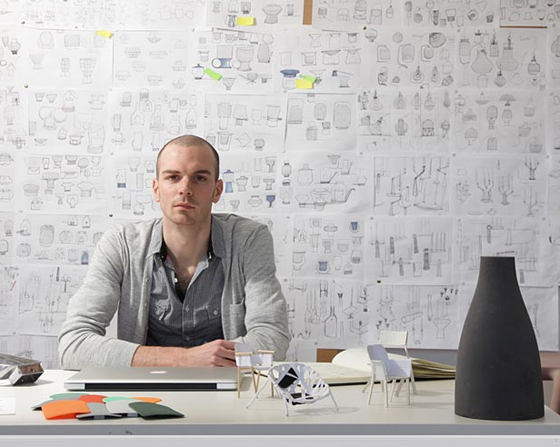
'Creating things that people can use and want, that work in their lives and enhance them as well – that's what motivates me': British designer Benjamin Hubert
×On the eve of the Milan Salone del Mobile, that behemoth of a design fair, whose vastness, both in terms of exhibited work and international visitorship, manages to excite and frustrate in equal measure – and where Hubert is going to be showing a number of products for such manufacturers as Casamania, Örsjö and Zero – we talked to the level-headed, London-based creative about where he's come from and where he's going.
'Maritime' timber chair by Benjamin Hubert for Casamania, launching at this year's Milan Salone del Mobile
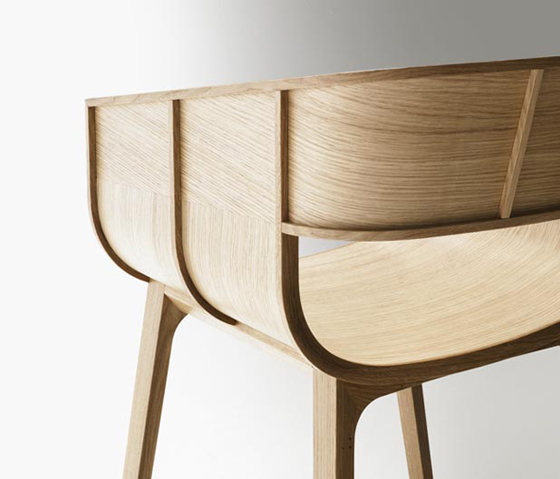
'Maritime' timber chair by Benjamin Hubert for Casamania, launching at this year's Milan Salone del Mobile
×…..
On his latest products
Even though it seems that I've been working on quite a lot of projects, the thing about fairs is that everybody decides whether they are going to get these ready for a particular fair or not. Some of the projects have been up to three years in development. It just so happens that a number of them have coincided for this year. Conversely, there were very few things last year.
Some of the projects started two or three years ago will have been me approaching manufacturers with ideas or a direction I wanted to take, or simply just sitting down and seeing what the opportunities were from their side and then just pitching ideas at them. On the other hand, some of the work has been where I've been invited to do projects. These tend to have been shorter in length. A year or a year and a half.
On manufacturers
One of the things I've learnt over the last few years is to really use the strength of the manufacturer. The type of factories and expertise that they have. That will guide the direction of a project, whatever material you're looking at. Whether they have a budget for tooling and so on. All of these things will push a project in a certain direction. We usually pitch a range of ideas for a project. Very rarely is there a single concept. At that point, if there a three, or even ten concepts on the table, it's a collaborative thing: the manufacturer and I talk about which is the best direction for all parties. From that point of view, the manufacturer's own personality is also injected into the project.
Hubert's new 'Paddle' lamp for Fabbian, which will be shown at Euroluce during the Milan Furniture Fair
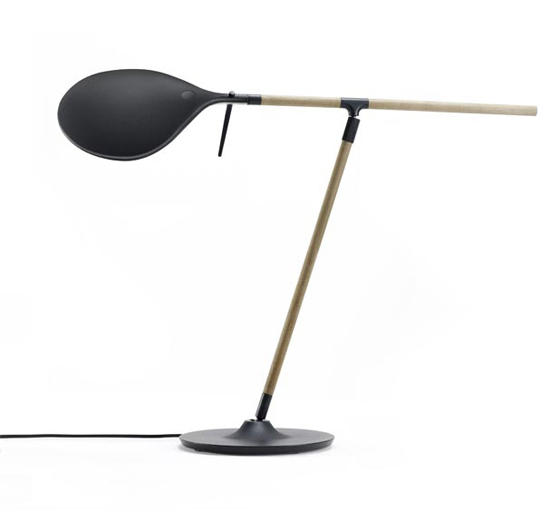
Hubert's new 'Paddle' lamp for Fabbian, which will be shown at Euroluce during the Milan Furniture Fair
×On early recognition
There was quite a lot of attention on the studio a couple of years ago. There were lots of awards and good articles, and people were picking up the phone and seeing if we were interested in doing things. But awards come and go. They're not a mark of good design, that's for sure. They are part of the machine and you have to play the game to get noticed. It's a fickle industry and you have to get involved in things that stand you out from the crowd.
Detail of Benjamin Hubert's 'Pod' chair for Devorm, which will be presented during the 2011 Salone in the Ventura Lambrate
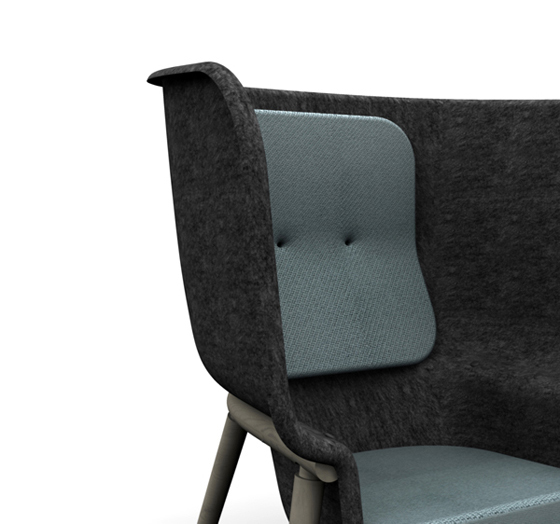
Detail of Benjamin Hubert's 'Pod' chair for Devorm, which will be presented during the 2011 Salone in the Ventura Lambrate
×On professional pressure
I feel a certain amount of pressure, not because of any kind of professional recognition – whatever that is – but because of the point I'm at now where I have opportunities to shape my career. The decisions I make now and the people I work with now are going to be good or bad for the rest of my working life. If we are really trying to create innovative products, then I need to be working with the people who can deliver those products. The biggest brands with the best resources, who will really invest in development projects. The smaller steps I'm taking now will lead to bigger steps later. So I have to be careful with who I collaborate. Just try and do good, robust projects.
On consumption
It's a difficult issue, as I'm part of the machine. I've got two points of view on this, however. We shouldn't be producing and consuming as much, clearly. Designers should be designing better things. It seems obvious, but when you're trying to build a studio and a career, it's difficult to turn down work at the start. So, from that point of view, maybe I, or designers, contribute to the problem of consumption. I'm in the fortunate position now, however, to start thinking a little deeper. Taking fewer projects but making them more robust and rigorous in the design process, and making sure that, if we are creating something new, there is something innovative about it.
Being launched at this year's Euroluce in Milan, Benjamin Hubert's 'Roofer' pendant lamp for Fabbian
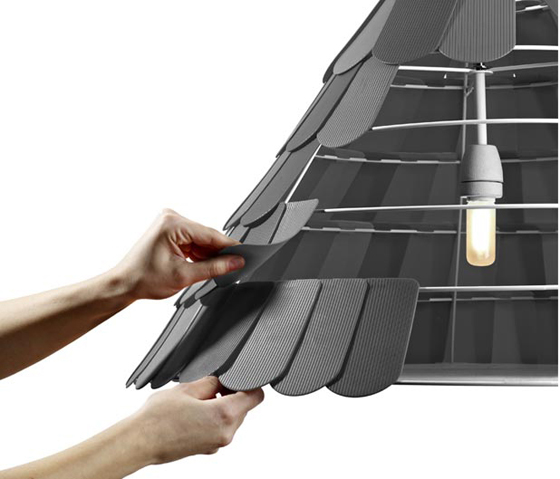
Being launched at this year's Euroluce in Milan, Benjamin Hubert's 'Roofer' pendant lamp for Fabbian
×On Milan
There is too much at Milan. All the manufacturers worldwide rotate around it. I don't know what the answer is to that, to be honest. I do know that most people I'm working with are reducing the number of things they launch, but I think that's an effect of the market and the recession and so on, rather than to do with conscience and a global outlook.
On new technologies
If a new technology offers something new and beneficial then I think it's valid. If it creates a lighter product, or uses less material, or can be stacked, or is a process that allows you to utilise a recycled material, then creating a form or a function that is directly related to that process actually validates the whole design process. Otherwise, you're strapping on styling in an arbitrary way.
Detail of 'Loom' organic textile pendant lamp by Benjamin Hubert for Zero; see it at the Euroluce expo during this year's Milan Salone
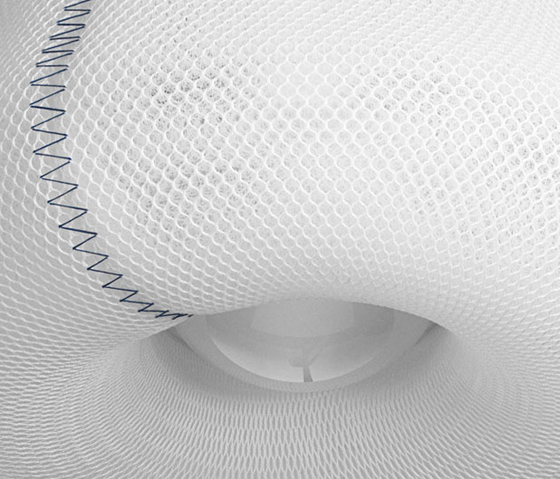
Detail of 'Loom' organic textile pendant lamp by Benjamin Hubert for Zero; see it at the Euroluce expo during this year's Milan Salone
×On the importance of materials
My training at university and then with some large design consultancies was quite hands-off in terms of materials. Lots of consumer goods, lots of injection moulding, lots of plastics and things that were theory-based. One of the reasons why I set my own studio up was to get closer to materials and to start integrating natural and synthetic materials. Just a much more tactile experience. It's a reaction against having such a theory-based handle on things previously.
On narrative in design
In the market of interior goods, it's about building connections with the user. It's about differentiating products as well. When people buy things for their home or interact with things in a restaurant, for example, it's a very personal experience. I think you have to create these narratives, create stories that people can really buy into. Otherwise, it's just more shapes. And I think we've moved past that. I try to integrate an emotional element into the products I design.
Also on show at the 2011 edition of Euroluce, Hubert's 'Crane' task light for Örsjö
On aspiration
I'd like my work in ten, twenty years time to be considered as really relevant and showing good innovative steps. It doesn't need to be profound work that changes society, but something that moves things forward a little bit and wasn't just of its time. I believe in a timeless relevance of products.
It's been very difficult getting the opportunity to work on those projects where you're producing serious new typologies of very accessible furniture, not just niche, high-end stuff. I'd like to be involved in pushing a manufacturing process further, like the Eames couple did, rather than just style. Of course, it's difficult to talk about this without referencing specific designers and I don't want to do that. But there are, of course, some designers who do style really well, and create brands from their stylistic direction. From a purely business point of view, it makes a lot of sense.
'Pebble', Benjamin Hubert's rotational-moulded chair for Devorm
On motivation
I like to create objects that people use. When I was first starting out, I did a lot of art and design simultaneously. And it was a choice to make things that were functional and useable that drew me to design. Need is a strong word, but creating things that people can use and want, that work in their lives and enhance them as well – that's what motivates me. I'm not talking in grand, sweeping terms, but things that delight people or improve the way they use something.
On sustainability
Sustainable design is such a bad term now, because all design should be sustainable. It's not a separate category, the way that people were defining it five or six years ago. The problem is that everybody likes to talk about sustainability on a project, even if the project isn't very sustainable. I don't think we're looking at it in the robust and holistic way that they should be, from the infrastructure around it, the shipping, all the way through to the material selection. You see so much on blogs where people have made things from recycled paper, but they're not considering the longevity of the project.
Hubert's 'Heavy' concrete pendant lights for Decode
On business
Someone distinguished in the Italian marketing and press world said to me 'You'll never be a big, successful designer unless you come from a rich family.' And I think this is true to a certain extent. I think it boils down to this: in order to be the biggest designer, you don't make decisions based on business. You make them based on design. So you try to only work with Vitra, Kartell, Flos and the like. Everyone would like to work with only those companies on serious, innovative projects that take a long time and are really new and interesting. But the reality is, as a business, that just doesn't work. Not at the start of your career. It's a royalty-based system and some of the decisions I make are based on business. It's about trying to manage the products that pay with the ones that are a little more illustrious and are with the important, significant brands. It's something I've learned over the last year or so. But if what the Italian guy told me is completely true, I'm done for!
On the next generation
Too many design graduates think that this is an incredibly glamorous industry. They see the magazine articles and the exhibitions and think 'I want a piece of that.' But, actually, it's very hard work. Very long hours. Quite stressful. They need to be prepared for that. If you're going to go into this industry, be prepared that it's going to take a long time to become established, a long time to make money. Don't do it for the wrong reasons. Does that sound too cynical? I hope not.
.....






